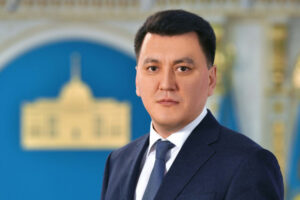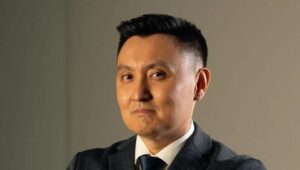ASTANA—Sectoral experts and state officials shared their insights on President Kassym-Jomart Tokayev’s annual state-of-the-nation address on key priorities, such as economic reforms, support for small and medium-sized enterprises (SMEs), agricultural financing, strategic investments and infrastructure modernization.

Erlan Karin. Photo credit: Akorda
Kazakhstan’s State Counsellor, Erlan Karin, noted on his Telegram channel that the President’s initiatives focus on systemic economic changes to improve citizens’ quality of life.
“Notably, the Address was delivered in the presence of deputies, ministers, akims [city administration], working professionals, National Kurultai members and regional council representatives, marking a new political tradition,” said Karin.
Karin noted that the address aims to tackle current issues while achieving the country’s long-term strategic goals. President Tokayev also addressed public concerns, including online fraud, road safety, military discipline, drug trafficking and shortages in medical and teaching personnel.
Nuclear power plant referendum
One of the key points of the address was the announcement of a referendum date on the construction of a nuclear power plant, a topic that has been widely discussed in public discourse over the past year.

Gaziz Abishev. Photo credit: kaztag.kz
“Building a nuclear power plant has actually been under consideration for 15 years. President Tokayev first mentioned it in 2019, promising a national referendum to decide the matter. Therefore, the discussion has been ongoing much longer than just a year,” said Kazakh political scientist Gaziz Abishev on his Telegram channel.
Political scientist Andrey Chebotarev mentioned the significance of the upcoming referendum, noting that public hearings and discussions in the regions and on social media have provided a comprehensive overview of the arguments for and against the project.
“It is important that there is now a clear date for further discussions. This allows people, especially those who were previously neutral, to make informed decisions,” said Chebotarev.
Abishev also pointed out that Kazakhstan’s energy balance is at the core of the discussions, noting the need to diversify energy resources across all sectors.
“When comparing the stability of the energy systems between countries with and without nuclear power plants, considering the amount of energy consumed and the penetration of technologies powered by electricity, the conclusions are quite clear,” Abishev noted.
Electability and political development
Regarding the introduction of electability for mayors of districts and cities of regional significance, Abishev shared that the initiative will encourage the development of political parties and the renewal of their personnel.
“Perhaps the decision to hold elections this year is related to the economic situation and the consequences of recent floods. This provides a valuable opportunity for political parties and public associations to prepare and identify candidates. Ordinary citizens will also have the chance to run, giving them time to prepare,” added Abishev.
He also discussed the significance of regulating internships of scientific specialists abroad.
“Many people go abroad, but questions arise about the effectiveness of these trips. The President emphasized the need to prevent the use of internships for academic tourism. Such trips must yield concrete results, such as scientific articles or the development of training courses,” said Abishev.
